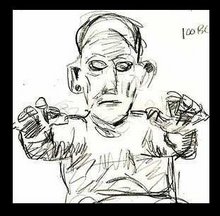My rating: 3 of 5 stars
Book in one sentence ...
Belief is the antitheses of Religion which is closer to poetry and people conflate knowledge with belief to the detriment of all mankind.
Here he means Belief to be "Belief Systems" and religion is defined by him as an open inquiring look at existence, much like poetry. And Religion is a process of learning ignorance that prompts us to strive ever harder toward higher aspiration. Or something like that.
For me the most intriguing part is his example of Galileo before the pope when he is asked to deny the truth of his scientific conclusions.
“When the pope assumed that belief (for him knowledge) represented the end of ignorance, Galileo saw it as the beginning of ignorance, Galileo was not a convert. The truth was not revealed to him. He came to it after a lifetime of study. He knew, as any critical thinker would, that knowledge is corrigible, and that belief is rarely so. Open to correction himself, he had not inclination and no reason to take an immovable stand. He could not perform an heroic act like Luther’s not because of cowardice but because there was nothing to stand on. Belief systems are already complete. No new knowledge can reverse their finality. Knowledge, in other words, is never knowledge against….” Pg 60
I feel this touches on so much, so much that is tantalizing and appealing for me. But it somehow misses the mark. The books comes close to showing how "higher ignorance" actually fuels knowledge AND religion but never quite gets there.
In my hackneyed and often inebriated explanation of Religion I have tried to use the poetry analogy but it never really makes an impression. People who "believe" don't need it and unbelievers don't care.
All in all I think he highlights and important and true but hard to pin down intersection of belief and knowledge AND how faith and ignorance are tied to them.
The problem is that, I think, that for the majority of people Religion IS a belief system, and various religions are simply an accumulation of enumerated beliefs. This is so for non-believers as well as "believers".
Looking at the way conservative Christians view the world it is easy to see the confusing of Belief with Knowledge. But then again, the non believer's view of the world can be just as rigid as the fundamentalist. They both thrive on anger and disdain of the other view.
I once watched "Flock of Dodos:" on Netflix and the amazing thing was the scientists were just as angry and dismissive of the fundamentalist as the Creationists were of the scientists. The manner and rhetoric was the same. Don't be confused, teaching science via the Bible is crazy, but still...maybe what bothered me was the fundamentalist were trying to use their religion as a belief system to explain science and the scientists acted like the creationists where attacking their religion, an everybody reacted emotionally. To be sure the fundamentalists ignored obvious evidence ("willful ignorance") but in one scene the anthropologists were almost apoplectic in their denunciation of their opposites and would never accept there might be a spiritual motivation for the other side. So the question is, should scientists even try to understand with compassion this alien point of view?
Perhaps related, decades ago I read a book that pointed out fundamentalists want to take the spiritual and turn it into the material in a perverse and flawed mimicry of science. That way you can prove that which truthfully can never be "proved".
The author struggles to define Religion, sometimes as poetry, comomunitas, longevity of existence, and more. But really I find the Dali Lama's definition more convincing, where religion as that which engenders "compassion". Simple and inspiring. (I have no attribution for this but I heard it somewhere). But compassion is something missing from this book and may explain why I find it lacking.
In fact there seems to be a gaping hole in this book; for me there is never a real feel of why people are religious at all. He mentions Jesus and Islam and Buddhism throughout, but never really indicates why one should bother. He is pretty good pointing out that the Religion as belief system is rigid and really the heart of all the bad press in any religion. But aside from this yearning for Religion as a poetic expression of a spiritual truth (although I don't think he ever used the word spiritual, which is odd to me)he is pretty unconvincing on why people should go down that road at all.
All in all the audience for this books strikes me as limited since if you think Religion is all bollocks anyway you see no point to entertaining these ideas. And those who are into some sort of religion seem to be pretty well set, why bother thinking about it any more.
Here are some quotes I like...
“Belief systems are stunningly resistant to such correction, for the simple reason that deeply held committed believers are not offering a variety of debatable proposals about the nature of the world. They see the world through their beliefs, not their beliefs from a worldly perspective” pg 28
“…belief marks the line at which our thinking stops…” pg 44
"Believers and warriors tend to merge into one another: the military sees itself in religious terms, while believers take one the images of warfare." Pg 77
"Religion in its purest form is a vast work of poetry." Pg 111
"Belief systems offer a rational and consistent view of everything...” pg 145
sacred texts...”They must be interpreted. That is they do not come to life until there is a living response to them.” pg 189
View all my reviews


No comments:
Post a Comment